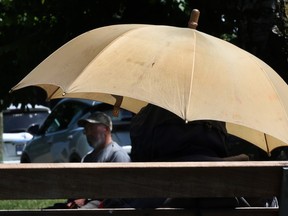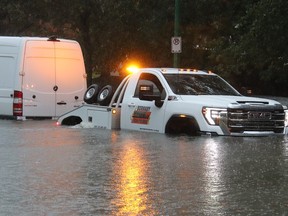Weekly roundup of local and international climate change news for the week of Oct. 21 to Oct. 27, 2024.

Article content
Here’s all the latest news concerning the climate crisis, biodiversity loss, and the steps leaders are taking to address these issues.
In climate news this week:
• Impact of heat waves on river flows to change rapidly under climate change
• UN warns world on track for 3.1 C of global warming by end of century
• Three die in B.C.’s atmospheric river
• Ottawa woman celebrates court victory for youth on climate change
Advertisement 2
Article content
Human activities like burning fossil fuels and farming livestock are the main drivers of climate change, according to the UN’s Intergovernmental Panel on Climate Change. This causes heat-trapping greenhouse gas levels in Earth’s atmosphere, increasing the planet’s surface temperature.
The panel, which is made up of scientists from around the world, has warned for decades that wildfires and severe weather, such as B.C.’s deadly heat dome and catastrophic flooding in 2021, would become more frequent and more intense because of the climate emergency. It has issued a “code red” for humanity and warns the window to limit warming to 1.5 C above pre-industrial times is closing.
Wildfires, like the one earlier this year in Jasper, are becoming worse because heat waves and drought are drying out vegetation and making it easier for fires to start and spread, according to the Canadian Climate Institute.
For example, during the eight days of the 2021 heat dome in B.C., the number of wildfires rose from six to 175, with fires that spread during that time consuming nearly 79,000 hectares, including the entire town of Lytton.
Advertisement 3
Article content
According to NASA climate scientists, “there is unequivocal evidence that Earth is warming at an unprecedented rate” and that human activity is the principal cause.
Check back every Saturday for more climate and environmental news or sign up for our Climate Connected newsletter HERE.
Climate change quick facts:
• The Earth is now about 1.3 C warmer than it was in the 1800s.
• 2023 was hottest on record globally, beating the last record in 2016.
• Human activities have raised atmospheric concentrations of CO2 by nearly 49 per cent above pre-industrial levels starting in 1850.
• The world is not on track to meet the Paris Agreement target to keep global temperature from exceeding 1.5 C above pre-industrial levels, the upper limit to avoid the worst fallout from climate change including sea level rise, and more intense drought, heat waves and wildfires.
• On the current path of carbon dioxide emissions, the temperature could increase by as much 3.6 C this century, according to the IPCC.
• In April, 2022 greenhouse gas concentrations reached record new highs and show no sign of slowing.
• Emissions must drop 7.6 per cent per year from 2020 to 2030 to keep temperatures from exceeding 1.5 C and 2.7 per cent per year to stay below 2 C.
• 97 per cent of climate scientists agree that the climate is warming and that human beings are the cause.
Article content
Advertisement 4
Article content
(Source: United Nations IPCC, World Meteorological Organization, UNEP, NASA, climatedata.ca)

Latest News
Impact of heat waves on river flows to change rapidly under climate change
Climate change means heat waves will affect river flows earlier in the spring until later in autumn, raising concerns about summer water supplies for municipalities and farmers, according to new research carried out at Simon Fraser University.
“If heat waves are able to more dramatically decrease snowpack in the late fall, winter and early spring we will have less snow available to sustain rivers in the spring and summer when we really need it for our agriculture and water systems,” said Sam Anderson, a post-doctoral fellow at SFU’s school of environmental science.
“We’re shifting into a mode where more water is released from storage in winter and early spring.”
Anderson and Shawn Chartrand, an environmental science professor at SFU, carried out two studies to investigate how climate change may alter the way the nation’s rivers react to future heat waves, looking at 860 Canadian river basins over the past 40 years, as well as the 80-year histories of another six river basins in Western Canada.
Advertisement 5
Article content
Anderson was motivated to undertake the research after the extraordinary heat wave of June 2021, when Lytton burned down and city dwellers sweltered.
Rivers had striking responses to that heat wave, he said.
—Gordon McIntyre

Weekend rainstorm a warning to Metro Vancouver municipalities: Infrastructure upgrades are needed
The atmospheric-river deluge that dumped a month’s worth of rain onto Metro Vancouver over the weekend is a reminder that municipalities need to build infrastructure capable of handling the bigger swings in rainfall caused by climate change.
Part of the problem is that municipal engineers use historical data and averages to estimate how much rain they will need to accommodate, according to civil engineer Troy Vassos, an adjunct professor in the University of B.C.’s engineering school.
However, the rain that Metro Vancouver has received over the past couple of decades “has been dramatically varied” than it was historically.
“We don’t have a consistent climate pattern any longer, for whatever reason.”
“If you’re all designing everything for 50 millimetres a day of rainfall, and give it a factor of safety of two, 100 millimetres, and then suddenly we’re getting 150-millimetre events or 170-millimetre events, you can see that very quickly you can exceed the standard design parameters,” Vassos said.
Advertisement 6
Article content
—Derrick Penner

World on pace for significantly more warming without immediate climate action, report warns
The world is on a path to get 1.8 C warmer than it is now, but could trim half a degree of that projected future heating if countries do everything they promise to fight climate change, a United Nations report said Thursday.
But it still won’t be near enough to curb warming’s worst impacts such as nastier heat waves, wildfires, storms and droughts, the report said.
Under every scenario but the “most optimistic” with the biggest cuts in fossil fuels burning, the chance of curbing warming so it stays within the internationally agreed-upon limit “would be virtually zero,” the United Nations Environment Programme’s annual Emissions Gap Report said.
The goal, set in the 2015 Paris Agreement, is to limit human-caused warming to 1.5 C since pre-industrial times. The report said that since the mid-1800s, the world has already heated up by 1.3 C, up from previous estimates of 1.1 or 1.2 C because it includes the record heat last year.
Instead the world is on pace to hit 3.1 C since pre-industrial times. But if nations somehow do all of what they promised in targets they submitted to the United Nations that warming could be limited to 2.6 C, the report said.
Advertisement 7
Article content
—The Associated Press
Ottawa woman celebrates court victory for youth on climate change
Ottawa’s Alexandra Neufeldt was 23 years old when she decided to join an unusual bid to win provincial action on climate change.
Neufeldt put herself forward five years ago as one of seven young plaintiffs in a lawsuit against the provincial government, alleging its greenhouse gas emissions policy violated the constitutional rights of Ontario’s youth.
They said the government’s decision to claw back emissions targets in 2018 violated the Charter’s guarantee of their rights to equality, life and security of the person.
“We don’t have any environmental rights explicitly laid out in the Charter, but we think our Charter rights should guarantee us a right to a healthy and stable climate,” said Neufeldt, now 28 and a freelance fashion designer. “And the court system has the potential to make that happen.”
In mid-October, in what environmental activists hail as a landmark ruling, Ontario’s highest court said the lawsuit brought by the seven young plaintiffs could proceed.
Advertisement 8
Article content
The Court of Appeal for Ontario overturned a lower court ruling, which dismissed the lawsuit as a “positive rights case” — a case that establishes a novel legal right — and said a new hearing must determine whether the government’s actions on greenhouse gas emissions comply with the Charter of Rights and Freedoms.
—The Ottawa Citizen
Cape Roger Curtis on Bowen Island protected for conservation
Metro Vancouver says an environmentally sensitive area at Cape Roger Curtis on Bowen Island will be protected following the sale of 65 hectares of land to the Bowen Island Conservancy.
Metro Vancouver connected with the conservancy after purchasing the land from a private developer, according to a news release Friday.
The conservancy owns the Wild Coast Nature Refuge and helps manage the Fairy Fen Nature Reserve and other land reserves on the island owned by the Islands Trust Conservancy.
In spring 2023, Metro Vancouver acquired 24 lots totalling 97 hectares of land at Cape Roger Curtis that had previously been slated for housing development.
The intent was to create a new regional park, and Metro Vancouver had proposed an option for supervised overnight tent camping.
Advertisement 9
Article content
While the existing zoning allows for park use, Metro Vancouver applied to Bowen Island Municipality for rezoning to allow for overnight tent camping. The application remains at first reading, and with the sale Metro Vancouver will withdraw its application.
The land was sold to the conservancy for $30.5 million. Metro Vancouver says it will be exploring options for the remaining 32 hectares.
—Tiffany Crawford

B.C. Green leader Sonia Furstenau answered David Eby’s call — but not John Rustad’s
The leaders of B.C.’s New Democrats and B.C. Conservatives have received the cold shoulder after looking to start minority government talks with the Greens following last weekend’s inconclusive election result, party leader Sonia Furstenau said Wednesday.
She said she spoke briefly with NDP Leader David Eby on Wednesday and described the exchange as a “conversation,” while a call from B.C. Conservative Leader John Rustad went unanswered.
“I didn’t recognize the phone number,” said Furstenau at a news conference flanked by two Green members elected Saturday, Rob Botterell, in Saanich-North and the Islands, and Jeremy Valeriote, from West Vancouver-Sea to Sky.
Advertisement 10
Article content
The NDP is elected or leading in 46 ridings and the Conservatives in 45 following Saturday’s election, both short of the 47 seats required for a majority.
A final count of ballots, which will include mail-in and absentee ballots, starts this weekend at the same time as the recounts for the ridings of Juan de Fuca-Malahat and Surrey City Centre, where the NDP leads by fewer than 100 votes.
Elections B.C. said the final results may not come in until Monday.
—The Canadian Press
Death toll rises to three after atmospheric river that drenched southern B.C.
At least three deaths have been linked to torrential rain from an atmospheric river weather system that hammered British Columbia’s south coast over the weekend.
On Vancouver Island, police said Tuesday that emergency personnel were waiting for an opportunity to safely recover the body of a driver whose vehicle was submerged when an overflowing river washed out a road near Bamfield on Saturday.
A statement from Port Alberni RCMP said they confirmed the person’s body was inside the vehicle on Monday, but high water levels and fast-moving currents in the Sarita River had so far prevented crews from accessing it.
Advertisement 11
Article content
The body of the another driver whose vehicle was also swept off Bamfield Road was earlier found a short distance from their truck, which was spotted in the water by a family member on Saturday night.
The same weather system set off a mudslide that swept away a home in the Metro Vancouver city of Coquitlam on Saturday. The body of a 57-year-old elementary school teacher was recovered in the wreckage on Sunday.
—The Canadian Press
B.C. Election: Who are the two Greens that could hold the balance of power?
B.C. is in a holding pattern pending the outcome of two recounts on Saturday, but, if election results hold, the decision about which party forms the next government could come down to two men: Jeremy Valeriote and Rob Botterell of the B.C. Greens.
Experts say the NDP could form a minority government with their support, either in a confidence-and-supply agreement similar to 2017 or on a vote-by-vote basis. Without it, the province could be plunged into another election as the Conservatives are unlikely to be able to form a government even with the backing of the Greens.
Advertisement 12
Article content
Jillian Oliver, press secretary for the Greens in 2017, said she believes the pair will be focused on what is best for the province.
“Anytime I’ve ever worked with (Green Leader Sonia Furstenau) or with other Green MLAs, that’s been the focus. How do we continue to push the government forward to a better place, both in terms of how the legislature functions and in terms of how you deliver for people,” she said.
Oliver said the two men are both experienced public servants who understand how the system works, but they face a tough slog given the weight of responsibility on their shoulders and the challenges that come with navigating the legislature as a two-person caucus.
She said this is where having Furstenau, who announced Tuesday she would remain as leader despite losing her seat in Victoria-Beacon Hill, and former MLA Adam Olsen as sounding boards will be critical.
NDP Leader David Eby believes the NDP can work with the Greens because of shared values, particularly around the environment and the necessity of public services.
—Alex Lazenby
Recommended from Editorial
Article content




